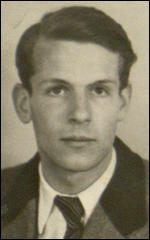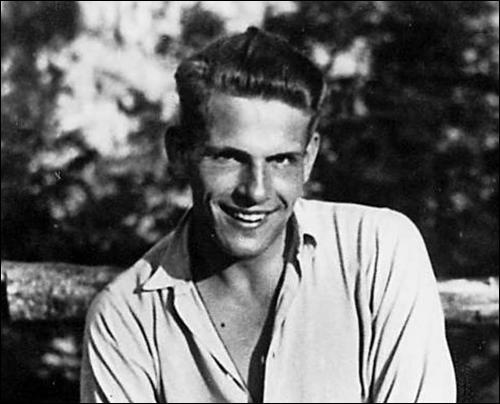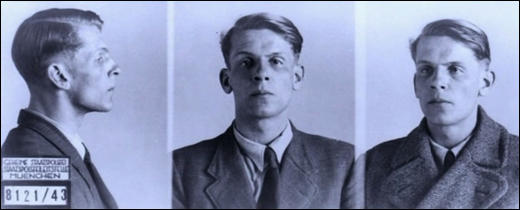Christoph Probst

Christoph Probst, the son of Hermann Probst, was born in Murnau am Staffelsee, Germany on 6th November, 1919.
Hermann Probst came from a merchant family and had inherited money that meant he did not have to work. He was sent to progressive and liberal boarding schools and to a high school in Munich, where he met Alexander Schmorell. (1)
When he was seventeen, his father, who suffered from depression, committed suicide. This caused problems for his stepmother as she was Jewish and no longer had the protection of a wealthy husband.
Probst and Schmorrel both studied medicine at the University of Munich. According to his biographer, "Probst was gentle, almost shy, a quality that can seem incongruous, if not slightly absurd, in a big man but that inspires admiration and love when it proves to be genuine." (2)
In 1940 Probst married Herta Dohrn. At first they lived with Christoph's stepmother. Over the next couple of years the couple had three children. "he was completely paternal; he adored his children. Through them he had found a haven, a place of warmth and laughter and predictability - one that seemed to have been lacking all his life." (3)
Christoph Probst & White Rose Group
Christoph Probst became friends with a group of students who had an interest in poetry. This included Alexander Schmorell, Hans Scholl, Sophie Scholl and Willi Graf. At meetings they took it in turns reading poems and the others had to guess the name of the poet. One evening, on 21st May, 1942, Hans read a poem about a tyrant that contained the passage: "Mounting the rubbish heap around him/He spews his message on the world." The people living under this tyrant accepted his rule: "The masses lived in utter shame/For foulest deeds they felt no blame." At the end, the poem predicts that this nightmare period will pass with the overthrow of the tyrant, and one day his reign will be looked back upon, and talked about, like the Black Plague.
No one at the meeting could identify the poet. Probst suggested that it had been written in Germany recently. "Anyway, those verses couldn't be more timely. They might have been written yesterday." Schmorell agreed and suggested that the poem should be mimeographed and dropped over Germany from an airplane "with a dedication to Adolf Hitler". Graf added that it should be printed in the Völkischer Beobachter. Scholl then told the group the name of the poet was Gottfried Keller. "Actually, the verses were written in 1878, and they don't refer to events in Germany at all, but to a political situation in Switzerland. The author is Gottfried Keller". (4)
After this the meetings tended to be more political and the members discussed ways they could show their disapproval of Adolf Hitler and the Nazi Party. However, it remained a discussion group. As Anton Gill, the author of An Honourable Defeat: A History of German Resistance to Hitler (1994) has pointed out: "The group had no wish to throw bombs, or to cause any injury to human life. They wanted to influence people's minds against Nazism and militarism." (5)
The friends became known as the White Rose group. Hans Scholl soon emerged as the group's leader: "The role was tacitly bestowed on him by virtue of that quality in his personality that, in any group, made him the focus of attention. Alex Schmorell was usually at his side, his close collaborator. Between them, they arranged for meetings and meeting places.... Sometimes they met in Hans' room for impromptu talk and discussion. For larger meetings, they gathered at the Eickemeyer studio or the villa of Dr. Schmorell, an indulgent father who shared many of his son's views." (6)
Leaflet Campaign
Christoph Probst was promoted to the rank of sergeant in the medical service and posted to Innsbruck. (7) While he was away the group began publishing leaflets. They were typed single-spaced on both sides of a sheet of paper, duplicated, folded into envelopes with neatly typed names and addresses, and mailed as printed matter to people all over Munich. At least a couple of hundred were handed into the Gestapo. It soon became clear that most of the leaflets were received by academics, civil servants, restaurateurs and publicans. A small number were scattered around the University of Munich campus. As a result the authorities immediately suspected that students had produced the leaflets. (8)
According to the historian of the resistance, Joachim Fest, this was a new development in the struggle against Adolf Hitler. "A small group of Munich students were the only protesters who managed to break out of the vicious circle of tactical considerations and other inhibitions. They spoke out vehemently, not only against the regime but also against the moral indolence and numbness of the German people." (9) Peter Hoffmann, the author of The History of German Resistance (1977) claimed they must have been aware that they could do any significant damage to the regime but they "were prepared to sacrifice themselves" in order to register their disapproval of the Nazi government. (10)
Christoph Probst remained in close contact with the White Rose group and in January 1943, Hans Scholl asked him if he would write down his ideas on the current political situation. (11) The following month Probst arrived in Munich to deliver an article he had written about the subject. On his arrival he was told by Hans that he and Alexander Schmorell had been going out at night painting slogans such as "Freedom" and "Down with Hitler!" on the walls in Munich. He told his friends that "these nocturnal forays were dangerous and foolish." (12)

Probst discovered that the White Rose had grown and that Jugen Wittenstein, Traute Lafrenz and Gisela Schertling were now very active members. Inge Scholl, Hans and Sophie's sister, who lived in Ulm, also attended meetings whenever she was in Munich. "There was no set criterion for entry into the group that crystallized around Hans and Sophie Scholl... It was not an organization with rules and a membership list. Yet the group had a distinct identity, a definite personality, and it adhered to standards no less rigid for being undefined and unspoken. These standards involved intelligence, character, and especially political attitude." (13)
Probst had written the article requested by Hans Scholl. It talked about "an honorable end to the war" and proposed that after the war a new international order, under the leadership of Franklin D. Roosevelt. (14) Later he claimed that he did not know that Scholl intended to use the material in the article for a leaflet, but he did admit that he was aware "that it might be used for illegal propaganda". (15)
Arrest & Execution
On 18th February, 1943, Sophie and Hans Scholl went to the University of Munich with a suitcase packed with leaflets. According to Inge Scholl: "They arrived at the university, and since the lecture rooms were to open in a few minutes, they quickly decided to deposit the leaflets in the corridors. Then they disposed of the remainder by letting the sheets fall from the top level of the staircase down into the entrance hall. Relieved, they were about to go, but a pair of eyes had spotted them. It was as if these eyes (they belonged to the building superintendent) had been detached from the being of their owner and turned into automatic spyglasses of the dictatorship. The doors of the building were immediately locked, and the fate of brother and sister was sealed." (16)
Jakob Schmid, a member of the Nazi Party, saw them at the University of Munich, throwing leaflets from a window of the third floor into the courtyard below. He immediately told the Gestapo and they were both arrested. They were searched and the police found a handwritten draft of another leaflet. This they matched to a letter in Scholl's flat that had been signed by Christoph Probst. He was arrested on 20th February. Following interrogation, they were all charged with treason. (17) Christoph, Sophie and Hans were not allowed to select a defence lawyer. Inge Scholl claimed that the lawyer assigned by the authorities "was little more than a helpless puppet". (18)

The trial took place on 22nd February, 1943. The indictment stated: "Early in 1943 the accused Hans Scholl requested that his friend, the accused Probst (with whom he had for a long time exchanged ideas about the political situation), write down his ideas on current political developments. Probst then sent him a draft, which without doubt was to be duplicated and distributed, though there was no time for such action. This draft was found in Scholl's pocket at the time of his arrest." (19)
Judge Roland Freisler argued in court that Probst was guilty of producing "in cowardly defeatism" a leaflet "which takes the heroic struggle in Stalingrad as the occasion for defaming the Führer as a military swindler and which then, progressing to a hortatory tone, calls for opposition to National Socialism and for action which would lead, as he pretends, to an honorable capitulation. He supports the promises in this leaflet by citing-Roosevelt! And his knowledge about these matters he derived from listening to British broadcasts!."
Freisler added that Probst's defence was that he had not intended the material to be used as a leaflet was not convincing or acceptable: "Whoever acts in this way - and particularly at this time, when we must close our ranks - is attempting to cause the first rift in the unity of the battle front. And German students, whose traditional honor has always called for self-sacrifice for Volk and fatherland, were the ones who acted thus!" (20)
Christoph Probst was beheaded on the evening of 22nd February, 1943.
Primary Sources
(1) Indictment of Christoph Probst drawn up by the Reich Attorney General (21st February, 1943)
Early in 1943 the accused Hans Scholl requested that his friend, the accused Probst (with whom he had for a long time exchanged ideas about the political situation), write down his ideas on current political developments. Probst then sent him a draft, which without doubt was to be duplicated and distributed, though there was no time for such action. This draft was found in Scholl's pocket at the time of his arrest.
(2) Judge Roland Freisler, sentencing Christoph Probst (22nd February, 1943)
Probst likewise began his medical studies in the spring of 1939 and is now in his eighth semester, a soldier on student duty. He is married and has three children aged two and a half, one and one fourth years, and four weeks. He is a "non-political man" - hence no man at all! Neither the solicitude of the National Socialist Reich for his professional training nor the fact that it was only the National Socialist demographic policy which made it possible for him to have a family prevented him from writing at the behest of Scholl - in cowardly defeatism - a "manuscript" which takes the heroic struggle in Stalingrad as the occasion for defaming the Führer as a military swindler and which then, progressing to a hortatory tone, calls for opposition to National Socialism and for action which would lead, as he pretends, to an honorable capitulation. He supports the promises in this leaflet by citing - Roosevelt! And his knowledge about these matters he derived from listening to British broadcasts!
All the accused have admitted the facts stated above. Probst offers as excuse his "extreme depression" of the time he drafted the leaflet, a depression which he claims arises from Stalingrad and the childbed illness of his wife. But such explanations do not excuse a reaction of this scope.
Whoever has, like the three accused, committed the acts of high treason, weakening the home front and thereby in time of war the security of the nation, and by the same token has aided the enemy, raises the dagger for a stab in the back of the Front! That applies also to Probst, though he claims that his manuscript was not intended for use as a leaflet - since its tone and style proves the opposite. Whoever acts in this way - and particularly at this time, when we must close our ranks - is attempting to cause the first rift in the unity of the battle front. And German students, whose traditional honor has always called for self-sacrifice for Volk and fatherland, were the ones who acted thus!
If a deed of this sort were to be punished otherwise than by death, we would be forging the first links of a chain whose end-in an earlier time-was 1918. Therefore, for the protection of the Volk and the Reich at war, the People's Court has found but one just punishment: death. The People's Court knows that it is at one with our soldiers in this decision.
Through their treason to our Volk, the accused have forever forfeited their citizenship. As criminals who have been found guilty, the accused will pay the court costs.
(3) Münchner Neueste Nachrichten (22nd February, 1943)
On February 22, 1943, the People's Court, convened in the Court of Assizes Chamber of the Palace of Justice, sentenced to death the following persons: Hans Scholl, aged 24, and Sophia Scholl, aged 21, both of Munich, and Chrstoph Probst, aged 23, of Innsbruck, for their preparations to commit treason and their aid to the enemy. The sentence was carried out on the same day.
Typical outsiders, the condemned persons shamelessly committed offences against the armed security of the nation and the will to fight of the German people by defacing houses with slogans attacking the state and by distributing treasonous leaflets. At this time of heroic struggle on the part of the German people, these despicable criminals deserve a speedy and dishonorable death.
(4) Völkischer Beobachter (21st April, 1943)
The People's Court of the German Reich, in session in Munich, dealt with a number of accused persons who were involved in the high treason of the brother and sister School sentenced on February 22, 1943.
At the time of the arduous struggle of our people in the years 1942-43, Alexander Schmorell, Kurt Huber, and William Graf of Munich collaborated with the Scholls in calling for sabotage of our war plants and spreading defeatist ideas. They aided the enemy of the Reich and attempted to weaken our armed security. These accused, having through their violent attacks against the community of the German people voluntarily excluded themselves from that community, were punished by death. They have forfeited their rights as citizens forever.
Student Activities
The Political Development of Sophie Scholl (Answer Commentary)
The White Rose Anti-Nazi Group (Answer Commentary)
Kristallnacht (Answer Commentary)
Adolf Hitler's Early Life (Answer Commentary)
Heinrich Himmler and the SS (Answer Commentary)
Trade Unions in Nazi Germany (Answer Commentary)
Adolf Hitler v John Heartfield (Answer Commentary)
Hitler's Volkswagen (The People's Car) (Answer Commentary)
Women in Nazi Germany (Answer Commentary)
German League of Girls (Answer Commentary)
